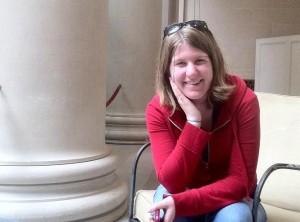Bringing Women into the Public Sphere

There are few things better than getting re-inspired about a cause you believe in. Nicholas Kristof’s speech at Washington University last week did exactly that. Kristof, noted New York Times columnist and all-around BAMF (for proof of his BAMF status, read the text of his interview with WUPR here) was promoting his recent book Half the Sky, in which he advocates for empowering women to better society as a whole. Some of that benefit is purely numerical: half of our population is underutilized, which means that we’re nowhere near our potential efficiency as a global economy and as a global community. The other portion of that benefit seems more dispositional: as Kristof says, when women earn a steady income they are more likely to use it productively on their families, education, and communities and are far less likely than men to spend money on alcohol, drugs, or prostitutes.
The root of female empowerment will be education, which I will address in the next column, but the idea that women use their role as primary breadwinner differently struck a chord. In my own conception of feminism, men and women are inherently different, so strict equality in the sense of not differentiating between men and women would be counterproductive and weird. The goal is not some gender-blind society of functionally equivalent androgynes. Rather, the differences between men and women should be accepted and–here’s the key– valued equally. Women shouldn’t need to “act like men” to be successful in professional settings, as many say they must today. Various “masculine” or “feminine” elements may be favorable in a given situation, but each should be valid and useful in a given context—neither men nor women should be relegated solely to the private sphere.
The idea that women’s roles and dispositions (to say nothing of whether they’re innate or socialized… yet!) could be immensely beneficial to the community reminded me of an experience I had over the summer. What should have been a 3 hour train ride from New York City to Boston turned into a 7 hour delay because of a half hour thunderstorm that downed a single tree across the tracks. The infuriating thing is that no one– and I mean no one– seemed to have any information about what was going on. The folks on the helpline were very pleasant, but assured me that the train had already come (it hadn’t), would be there in 15 minutes (it wouldn’t) and that there was no expected delay (really?). More often than not I found myself having to explain the situation to the employees and, in one very tense moment, ask in the most diplomatic way possible if there was a clock in the call center, as it was now 5:50, making the scheduled 4:30 departure impossible.
One of my family’s cardinal rules is that one should always be nice to employees. It makes them more inclined to help you and getting angry serves no further purpose for either of you. It was this very rule (and, likely, overhearing the clock conversation) that attracted the attention of another passenger, an Iranian man who had worked for many years with UNICEF. He was quick to comment on the fact that this cooperative communication style was one he’d observed from women all around the world. Over the course of his work with children in conflict zones, he realized that it would be most effective to have women play a larger role in peace talks– the discussion would ostensibly be more cooperative than competitive and could more easily lead to a consensus. This is not to devalue the work of men in conflict resolution, but to add a new, equally valued (aha!) element that women bring to the negotiating table.
This notion fits in perfectly with the goals of feminism that I’ve outlined, to further women’s participation and opportunity in public settings, and shows off how so-called “feminine” aspects, far from being more suited to the private sphere, are exceedingly useful in greater social contexts. As Kristof advocates, we should work to enable more situations like this, where women are valued and, to put it bluntly, necessary.
Until next time, that’s what she said.